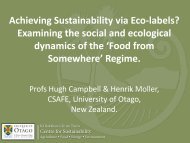Farming Systems Research - IFSA symposium 2012
Farming Systems Research - IFSA symposium 2012
Farming Systems Research - IFSA symposium 2012
Create successful ePaper yourself
Turn your PDF publications into a flip-book with our unique Google optimized e-Paper software.
<strong>Farming</strong> <strong>Systems</strong> <strong>Research</strong>:<br />
Learning from history<br />
Nadarajah Sriskandarajah<br />
Professor of Environmental Communication<br />
Department of Urban and Rural Development<br />
Swedish University of Agricultural Sciences<br />
Uppsala
Environmental communication situated<br />
at the point of crises<br />
- human-caused threats to both<br />
nature and society<br />
- failure of institutions to engage<br />
adequately with these threats<br />
Cox 2005
Environmental Communication<br />
Society’s<br />
Constructing of<br />
Environmental<br />
Problems<br />
Understanding<br />
our Perception of<br />
the Environment<br />
as a way of working with<br />
Negotiating<br />
Society’s Responses<br />
Instrumental<br />
Reaching out and<br />
Creating Change
Fresh from Rio<br />
“We think the text contains a lot of action, and if<br />
this action is implemented, and if follow‐up<br />
measures are taken, it will indeed make a<br />
tremendous difference in generating positive<br />
global change.”<br />
‐ Sha Zukang<br />
Secretary‐General, Rio+20<br />
20 June <strong>2012</strong>
Fresh from Rio<br />
“We think the text contains a lot of action, and if<br />
this action is implemented, and if follow‐up<br />
measures are taken, it will indeed make a<br />
tremendous difference in generating positive<br />
global change.”<br />
‐ Sha Zukang<br />
Secretary‐General, Rio+20<br />
20 June <strong>2012</strong>
Insights from early days<br />
Inadequacies of development efforts<br />
Limited adoption of research recommendations by small farmers<br />
Priorities from researcher’s perspective<br />
Contrast between research between research station and<br />
surrounding farms<br />
Difficulties of interdisciplinary research<br />
Problem of social scientists<br />
Low ratios of professionals to farmers<br />
<strong>Farming</strong> systems as basic unit for agricutlural R & D<br />
Trade-off between coverage and intensity of effort<br />
Qualtitative versus quantitative investigations<br />
Small farmers’ willingness to learn and to change<br />
Value of learning through experience
Failure of development efforts<br />
Farm <strong>Farming</strong><br />
<strong>Farming</strong> as human activity system<br />
FSR-E, FSRE, AFSRE, <strong>IFSA</strong><br />
On the systems dimension of <strong>Farming</strong> <strong>Systems</strong><br />
<strong>Research</strong> (1996)<br />
’<strong>Systems</strong>’ as objects of study – how things are?<br />
’<strong>Systems</strong>’ as mental constructs – how we wish<br />
them to be?
<strong>Farming</strong> <strong>Systems</strong> <strong>Research</strong><br />
-an approach to inquiry<br />
-a way of seeing the world (<strong>2012</strong>)<br />
<strong>Farming</strong> <strong>Systems</strong> <strong>Research</strong><br />
-as a diagnostic process (2000)<br />
-a basket of methods for researchers to elicit a<br />
better understanding of farm households and<br />
their decision-making processes
Rich variety Vs Single definition<br />
No unified conceptual framework (theory)<br />
- is it feasible? needed? useful?<br />
Why is FSR not in the mainstream?<br />
-donor fatigue, demands of institutions,<br />
universities
The primary challenge lies not with the<br />
development of<br />
‘agri-food systems out there’
ut<br />
with the development of<br />
‘learning systems’<br />
which then allow us to make sense of,<br />
and take appropriate actions<br />
as participants in the ‘systems out there’
<strong>Farming</strong> System as a Learning System <strong>Farming</strong> system as the ‘object’ of inquiry<br />
The farmer as the focus of our inquiry<br />
The farm as the focus of our inquiry
HARD SYSTEMS thinking has not been<br />
successful with soft, ill-structured<br />
problems involving humans<br />
HARD SYSTEMS Problems solutions<br />
means-end rationality<br />
SOFT SYSTEMS Problem situations arise when<br />
people have contrasting views of the same<br />
situation, many view points, therefore many<br />
relevant problems<br />
rejects ‘means-end rationality’, but question the<br />
end itself and then considers ‘what should be<br />
done?
SOFT SYSTEMS THINKING<br />
‘a form of systemic thinking that understands<br />
reality as the creative construction of human<br />
beings’<br />
It therefore generates and works with an evolving<br />
appreciation of people’s points of view and<br />
intentions<br />
<strong>Systems</strong> concepts are employed in the process of<br />
meaning construction, reflecting an intuitive<br />
assumption that the world is indeed systemic<br />
‘authentic’ understanding of any action context requires<br />
participation of all ‘stakeholders’
Checkland’s<br />
Soft <strong>Systems</strong> Methodology<br />
(SSM)<br />
most thoroughly documented and discussed<br />
methodological example fo soft systems thinking<br />
typically introduced as a seven‐stage process
Methodological<br />
Personal<br />
Institutional<br />
Three entry points for change
Reflexivity<br />
-solid grasp of assumptions underlying various<br />
theories and methods used, their strengths and<br />
weaknesses<br />
-aware of the relationship between production of<br />
knowledge, the producer, and the contexts of<br />
those knowledge production processes<br />
-clarify the taken-for-granted assumptions and<br />
blind spots arising from preferences of the past<br />
-aware of all the influences we bring into shaping<br />
the research and interpreting the findings
Knowing ’what we do, when we do what<br />
we do’ (Ison)<br />
Making conscious choices, aware of<br />
inevitable weaknesses, able to defend the<br />
critiques<br />
It is not the methods but the ontology and<br />
epistemology which determine good<br />
science<br />
’Good research’ but also ’right research’
For me, not only ’what we do when we<br />
do what we do’<br />
but also the questions:<br />
Where?<br />
Which spaces?<br />
With whom? Why so?
One challenge of Sustainability<br />
– Public institutions experience increased pressure on their<br />
legitimacy<br />
– One response: ‘Involving’ various citizen groups<br />
– Many seem just fulfilling the role as ‘suppliers’ of legitimacy<br />
for pre‐determined institutions<br />
– We scrutinize the ability of such institutions to serve as<br />
democratic agoras activating the responsibility of local<br />
communities and addressing common concerns and visions<br />
Agora = Public space or a market place for<br />
discussing issues of common interest in ancient<br />
Greece











